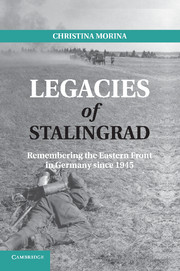1 - Memory under Occupation
The Emergence of Competing Memories of the Eastern Front
Published online by Cambridge University Press: 07 October 2011
Summary
Each generation writes its history anew. Even though past events remain what they are – they lie as if deceased in the what-has-been – the dead can return and haunt the present.
Theodor Heuss (1946)Despite the military occupation initially imposed on defeated Germany, Germans themselves, and more specifically the emerging political elites, shaped narratives about the Eastern Front. Postwar views of the past were not imposed on Germans by Allied occupation authorities. Political parties resumed political and intellectual traditions of the pre-1933 era. Their leaders initiated “multiple restorations of the non- and anti-Nazi political traditions of pre-1933 Germany – communism, social democracy, liberalism, and moderate conservatism – that came to dominate the post-1945 political culture of both Germanys.” In addition, the facts of where and how these leaders experienced the Nazi and wartime years had a tremendous impact on their interpretations of the Eastern Front. Thus, the evaluation of the immediate past depended to varying degrees on resumed political worldviews and traditions, past experiences during the Weimar and Nazi years, and the present sociopolitical situation in postwar Germany.
My intentionally ambiguous chapter title, “Memory under Occupation,” therefore refers more to the sociopolitical context and external circumstances than to the degree of interpretative influence of Allied occupation forces on matters of history and memory. The successful integration of a multitude of wartime experiences – suffering and loss, for example – was a crucial, necessary, and problematic step in the political reconstruction process, much more than German crimes and their victims. A coherent narrative promised and preconditioned the emergence of new, stable, collective identities, and a sense of loyalty to a new political system.
- Type
- Chapter
- Information
- Legacies of StalingradRemembering the Eastern Front in Germany since 1945, pp. 25 - 66Publisher: Cambridge University PressPrint publication year: 2011



